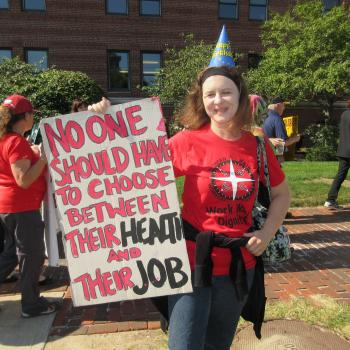NO, NOT ABOUT EATING PEOPLE; I’m saying he was right to ask this question of Clarice Starling: “First principles, Clarice. Simplicity. Read Marcus Aurelius. ‘Of each particular thing ask: What is it in itself? What is its nature?’”
The quote is from (or more accurately, inspired by) Marcus Aurelius’ “Meditations,” regarded as one of the masterworks of Stoic philosophy from Classical Antiquity.
I think that question is worth asking when it comes to our economic system. What is its nature?
My first job out of the Army was working at McDonald’s, one at a shopping mall near my home town. It was close to the holidays, so getting hired was a cinch, and the pay was $5 per hour — pretty OK money in 1987, the equivalent of $10.26 today.
I worked there for about a year, and note that I say the following as someone who has been in the labor force for 36 years and worked a wide variety of jobs: I have never worked that hard in my entire life, before or since. Not when I did grunt work for a local landscape contractor, not even when I was humping a heavy pack and rifle up and down hills for mile after mile in the Army.
I worked in the kitchen during the closing shift, and by the end of every long shift I ached all over, smelled like French fries and had enough animal fat on my skin and in my hair that I was probably a fire hazard. I’d head home after closing, try to keep my eyes open in the shower, and collapse into bed and sleep the sleep of the dead. (Hint to any young people who are thinking about getting into the food service industry: You always want to work the opening shift. You have to get up pretty early, but you’ll arrive at a squeaky clean restaurant and at the end of your shift hand off to the night crew, who will be responsible for cleaning up both their mess and yours before they can leave for the night.)
There was an older guy named Rick whose morning shift overlapped with mine. Rick was in his 50s, and his hair was mostly gray, and he’d had some kind of back surgery so he moved in a very deliberate way, as if every move he made was pre-planned to minimize the possibility of pain. Rick worked the grill where first the breakfast items, and later in the day the smaller (10 to a pound, hence the name “10-to-1 grill”) hamburger patties were cooked, and I learned a lot from him about how to manage tasks in such a way as to minimize stress and keep from getting jammed up during the lunch rush. He was always patient, always willing to share little tricks he’d picked up, never short with me. He’d have made a great high school coach, the kind whose players revere even 30 years later. He made my time there more bearable.
Rick lived in a camper shell on his pickup truck.
Barbara Ehrenreich, in her 2001 book about the working poor “Nickel and Dimed: On (Not) Getting By in America,” said the following (and note that her book was written between 1998 and 2000, more or less at the crest of the 1990s boom):
When someone works for less pay than she can live on — when, for example, she goes hungry so that you can eat more cheaply and conveniently — then she has made a great sacrifice for you, she has made you a gift of some part of her abilities, her health, and her life. The ‘working poor,’ as they are approvingly termed, are in fact the major philanthropists of our society. They neglect their own children so that the children of others will be cared for; they live in substandard housing so that other homes will be shiny and perfect; they endure privation so that inflation will be low and stock prices high. To be a member of the working poor is to be an anonymous donor, a nameless benefactor, to everyone else.
Ehrenreich is onto something there, but I would take it a step further. I would say that no society has the right to impose such “philanthropy” on its workers. Any society in which some “go hungry so that others can eat more cheaply and conveniently” is a society that, in the words of the biblical author, “cries out to heaven for vengeance” because it is indifferent to manifest depravity in its midst.
“Of each particular thing ask: What is it in itself? What is its nature?” Any society where some are required to neglect their children so that others can be cared for is one that is becoming a society in name only — one that, to borrow a phrase from Martin Luther King Jr., “is approaching spiritual death.”
The good news is that there are two efforts under way to address the injustices I’ve named.
One is the effort by fast food workers around the country to win a wage of $15 per hour. I support this: as I mentioned, I can say from personal experience that if workers were paid according to how tired they were at the end of a work day, fast food workers would be paid far better than they are today (and lots of bankers and Wall Street types would be paid considerably less.) The other is to raise the minimum wage to $10 per hour. Given the cost of even basic shelter in the Bay Area, where I live, or in places like New York City, that would be a start, but I think the minimum in our region should be more like $12 or $13 per hour or more.
Both initiatives are worthy of your support.












